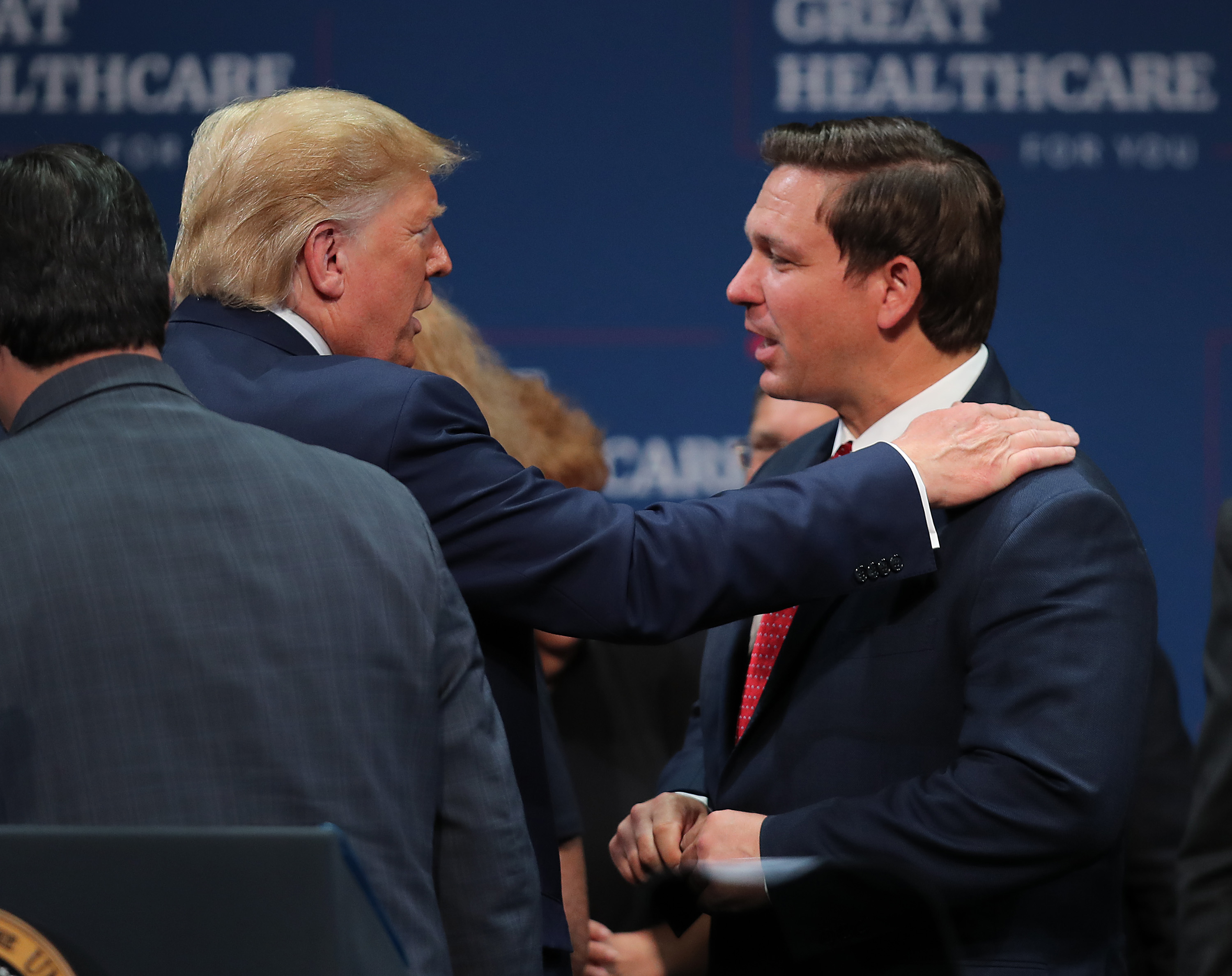The coming policy skirmishes between Trump and DeSantis
The two Republicans diverge in ways that could be key in appealing to voters


A free daily email with the biggest news stories of the day – and the best features from TheWeek.com
You are now subscribed
Your newsletter sign-up was successful
As the contest for the 2024 GOP presidential nomination takes shape, the leading candidates in polls continue to be former President Donald Trump and Florida Gov. Ron DeSantis (R). While DeSantis' standing in polls has slid and he has yet to launch his campaign, he is still widely expected to do so. DeSantis spent much of his first term as a reliable Trump ally, but as a presidential candidate, he would face the challenge of distinguishing himself from his former patron. Here are three significant issues where Trump and DeSantis either have some real policy differences, or claim to, and how they might impact the race.
COVID-19
Perhaps the highest-profile difference between the two men is on COVID-19 policy and vaccines. Trump, of course, oversaw the Operation Warp Speed effort which helped deliver the miraculous mRNA vaccines in less than a year from the beginning of the U.S. outbreak. Even the former president's legions of critics credit him for making that investment and then encouraging Americans, including his ardent followers, to get vaccinated. After downplaying the threat throughout Feb. 2020, and asking his advisers if it would be possible to let COVID-19 "wash over us," Trump also declared a national emergency on March 13 and then asked people to work from home and limit travel on March 17.
DeSantis, on the other hand, has emerged as one of the country's leading COVID vaccine skeptics. He expressed opposition to vaccinating infants and toddlers against the disease. In Dec. 2022, he asked the Florida Supreme Court to impanel a grand jury to look into wrongdoing associated with the vaccine rollout, including what he called misleading claims about the shots' safety and efficacy. While DeSantis locked Florida down early in the pandemic, he later became one of the first governors to return to business as usual, sending students back to school in person for fall 2020 and lifting all business restrictions in September of that year. He never issued a statewide mask mandate. The Republican base is clearly closer to DeSantis on these issues, and he will likely seek to tie Trump to the kinds of restrictive blue-state COVID policies that GOP voters opposed.
The Week
Escape your echo chamber. Get the facts behind the news, plus analysis from multiple perspectives.

Sign up for The Week's Free Newsletters
From our morning news briefing to a weekly Good News Newsletter, get the best of The Week delivered directly to your inbox.
From our morning news briefing to a weekly Good News Newsletter, get the best of The Week delivered directly to your inbox.
Abortion
There are also emerging differences over abortion, an issue that will likely play an enormous role in the 2024 presidential and congressional elections. Earlier this month, DeSantis signed a restrictive ban on all abortions after six weeks of pregnancy, a timeline that effectively eliminates access to the procedure for most people in the state of Florida. Nationally, that position is extremely unpopular, with just 35 percent of adults supporting a six-week ban in a recent Reuters/Ipsos poll. DeSantis has not revealed what actions he would take as president about abortion, but it is reasonable to assume that he would sign a six-week ban if one was forwarded to him by Congress.
Trump, of course, is responsible for appointing three of the justices who voted to overturn Roe v. Wade last summer in Dobbs v. Jackson Women's Health Organization. And he recently boasted about his accomplishment, saying in Iowa that he had "delivered a landmark victory for protecting innocent life" by remaking the Supreme Court. Trump, however, maintains that the issue should be left to the states, which now has him at odds with conservative activists gunning for a national ban. Especially in the GOP primary, supporting a national ban would be a pretty obvious way for DeSantis to outflank Trump on the right.
Entitlements
As a candidate and as president, Trump consistently promised to protect Social Security and Medicare. And while he was never given the opportunity to sign cuts to the popular programs into law, he is still using his support for preserving them as a crucial element of his 2024 campaign. "Under no circumstances should Republicans vote to cut a single penny from Medicare or Social Security," he told House Republicans in a terse, two-minute video in January.
DeSantis, as a member of the U.S. House of Representatives, voted for a 2013 resolution that called for raising the retirement age to 70 and privatizing Medicare. As a member of the House Freedom Caucus, DeSantis stood with fiscal hardliners who sought a radical overhaul of these programs as well as other dramatic spending cuts. However, he now claims that becoming Florida's governor, with its enormous population of retirees, has opened his eyes to the importance of Social Security and Medicare and promises not to "mess with" them. Trump, however, will emphasize DeSantis' past remarks and positions, which are unpopular not just with general election voters but even with Republicans.
A free daily email with the biggest news stories of the day – and the best features from TheWeek.com
David Faris is a professor of political science at Roosevelt University and the author of "It's Time to Fight Dirty: How Democrats Can Build a Lasting Majority in American Politics." He's a frequent contributor to Newsweek and Slate, and his work has appeared in The Washington Post, The New Republic and The Nation, among others.
